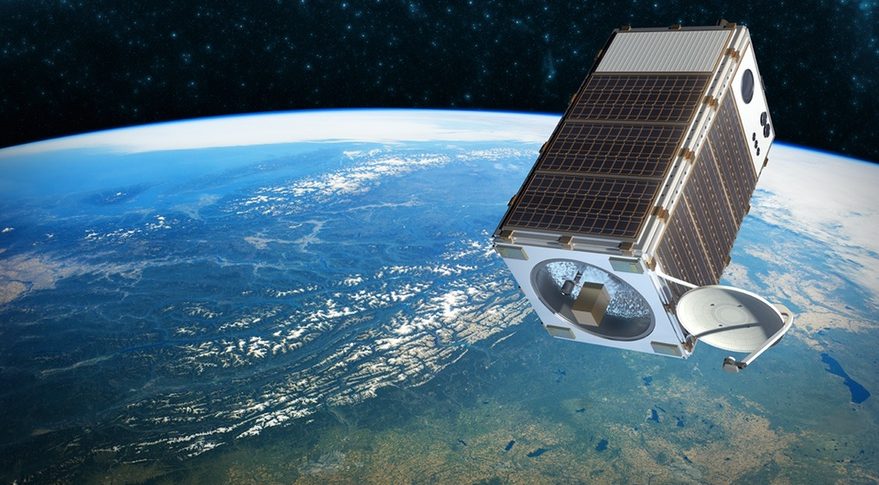Environmental Group Plans Satellite to Track Greenhouse Gas Emissions

WASHINGTON — An environmental group announced plans April 11 to develop and operate its own satellite to track one particular greenhouse gas, the latest sign of the proliferation of smallsat technology.
In a presentation at the TED conference in Vancouver, British Columbia, Fred Krupp, president of the Environmental Defense Fund (EDF), said that his organization planned to develop MethaneSAT, a small satellite designed specifically to measure methane emissions from human activities.
The satellite, the organization says, will be able to provide data on methane emissions, particularly from oil and gas facilities, with greater precision than existing satellites or other sensors. EDF plans to use the satellite to monitor 50 major oil and gas regions that account for more than 80 percent of global methane production, revisiting them on intervals of seven days or less. EDF will make data collected by MethaneSAT freely available. [Gallery: Amazing Images of Earth from Space]
"Cutting methane emissions from the global oil and gas industry is the single fastest thing we can do to help put the brakes on climate change right now, even as we continue to attack the carbon dioxide emissions most people are more familiar with," Krupp said in a statement. "By providing reliable, fully transparent data on a worldwide scale, MethaneSAT will help transform a serious climate threat into a crucial opportunity."
EDF has hired Tom Ingersoll, the former chief executive of Skybox Imaging, to help run the MethaneSAT project. At Skybox, he led the development of a constellation of high-resolution imaging satellites called SkySats. Skybox was acquired by Google in 2014 and renamed Terra Bella, and then sold to Planet in 2017.
"Advances in space technology have put satellite projects within reach of any organization with the focus and the will," Ingersoll said in the statement. "EDF has assembled the right partners with a strong vision and the ability to execute. The potential impact of the MethaneSAT mission has attracted the top talent in the industry to help successfully execute our vision."
Among those partners are Harvard University and the Smithsonian Astrophysical Observatory, who will develop the basic scientific and technical requirements for the mission. EDF expects MethaneSAT to be ready for launch in late 2020 or early 2021.
Get the Space.com Newsletter
Breaking space news, the latest updates on rocket launches, skywatching events and more!
EDF has disclosed few technical details about the mission. A rendering of MethaneSAT released by EDF shows a small spacecraft that looks superficially similar to the SkySat satellites developed by Skybox Imaging.
EDF spokesman Jon Coifman said April 12 that Ingersoll is working on the technical specifications of the satellite as well as an estimate of its cost. "We're a couple of months away from being ready to say more about the ultimate design, logistical or finance choices," he said.
The rendering of MethaneSAT, Coifman added, is based on the "best consensus opinion" of its ultimate design from involved in the project, and he said he was unfamiliar with any similarities in its design to that of the SkySats.
Initial funding for MethaneSAT is being provided by The Audacious Project, an initiative established by the organizers of the TED conference for "collaborative philanthropy for bold ideas." The initiative has raised more than $250 million to date, and MethaneSAT is one of five projects it announced April 11 it was backing. It did not disclose how much funding it was providing for the satellite.
Coifman said the satellite project was "in good shape" financially thanks to The Audacious Project funding and other EDF donors but didn't close specifics.
This story was provided by SpaceNews, dedicated to covering all aspects of the space industry.
Join our Space Forums to keep talking space on the latest missions, night sky and more! And if you have a news tip, correction or comment, let us know at: community@space.com.

Jeff Foust is a Senior Staff Writer at SpaceNews, a space industry news magazine and website, where he writes about space policy, commercial spaceflight and other aerospace industry topics. Jeff has a Ph.D. in planetary sciences from the Massachusetts Institute of Technology and earned a bachelor's degree in geophysics and planetary science from the California Institute of Technology. You can see Jeff's latest projects by following him on Twitter.










